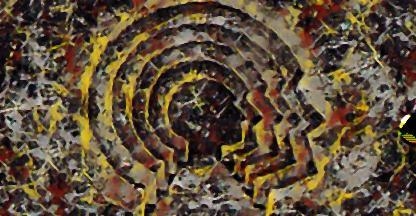Antonis N. Petrou, High School student
English translation: Constantinos Apothikianakis, Psychologist
The question I want to ask and try to answer is this: Can astrophysics affect the way we think? Can it change the way we see man and our existence? To answer this question I need to embark on a journey back in time. In fact, I'm going right where time is born, to this one event that we call the Big Bang!
13.8 billion years ago, all the matter and energy of the universe were concentrated in an infinitesimally small space. Suddenly, this space began to expand, giving rise to the universe as we know it today. In those early stages of the universe's creation, the only elements that existed were hydrogen and helium, the simplest and lightest elements imaginable. Subsequently, with hydrogen as the primary fuel, the first stars, or rather the first suns, began to form, and something very remarkable happened inside them. Due to very high temperatures and pressures, these simple elements (hydrogen, helium) transformed into more complex, heavier elements. Thus, when these stars reached the end of their lives, they either smoothly shed their outer envelopes or underwent super luminous explosions (Supernova), scattering all these new elements they had created within them throughout the galaxy.
About 4.6 billion years ago, in an ordinary corner of our galaxy, these materials accumulated and our solar system began to form, meaning the Sun and the planets we know. Of course, we are more familiar with one planet, and that's the one we are on. Life on Earth did not take long to appear. We say that the first life forms emerged around 3.5 to 4 billion years ago, referring to very simple, single-celled, photosynthetic life forms. The slightly more complex, multicellular life forms took quite some time to appear and are traced at around 1.5 billion years ago. From there, life flourished, giving rise to all the species we know today, species that walked, swam, or flew over this planet. After many millions of years, a very special species of mammal emerged, somewhere in Africa, which could use tools, communicate through language, and read articles in journals...
I am referring, of course, to the species to which we all belong, the species Homo Sapiens-Sapiens. A brand new species on the planet. We are the new creatures, and we have only existed for two hundred thousand years, which is 0.004% of the age of the Earth. In these few years of our existence, it has only been in the last 400 years that we have truly begun to open our eyes to the universe. Everything concerning celestial mechanics, the theory of relativity, quantum physics, cosmology, astrophysics... are new achievements. But along with this knowledge, some existential problems have intensified for us. Specifically, according to recent studies, there are 2 trillion galaxies in the universe, which means 2 followed by twelve zeros galaxies, each of which has an average of a hundred billion solar systems. As is easily understood, the value of a human being is very small, both in terms of space and in terms of time. Specifically, the age of the universe is 13.8 billion years, while the average lifespan of a human being, in a developed society, is merely 80 years... We are like sparks, appearing for a moment, and then disappearing. And for each one of us to exist, a sequence of biological and random events had to occur. Specifically, life had to appear on Earth, it had to evolve, and all the catastrophes and extinctions that occurred had to happen, exactly in the order they did. So, ultimately, mammals emerged, we reached homo sapiens, and for each one of us individually, there had to be a specific, though random, moment in time for our parents to meet and their genetic material to combine to form our specific DNA, and not one of the countless other DNA molecules that could have formed. Thus, we are these fortunate few, the minority of people who could exist... and ultimately did! In this sense, our existence seems almost improbable! However, I have the feeling that we do not appreciate it enough, and many times we focus more on the fact that this journey will eventually end, which is true. But whenever and if ever that happens, there is something that no one can ever take away from us. And that is the fact that we existed! That we had, even if for a very brief moment, the opportunity to feel the universe with our senses and understand it with our minds. Therefore, through the prism of astrophysics, I believe that every second we live seems precious and unique. Think about how differently we would live our lives, or how differently we would build our daily routines if we had this mindset constantly in our heads. Think about those little hesitations... those small delays... consider, for example, all those times when we didn't dare express our love and feelings for someone else, because we lacked courage... or those times when we didn't dare follow our dreams, because it wasn't convenient for others... I think that every such delay is automatically nullified through this prism; this is truly our moment, and it deserves to be experienced to the fullest.


